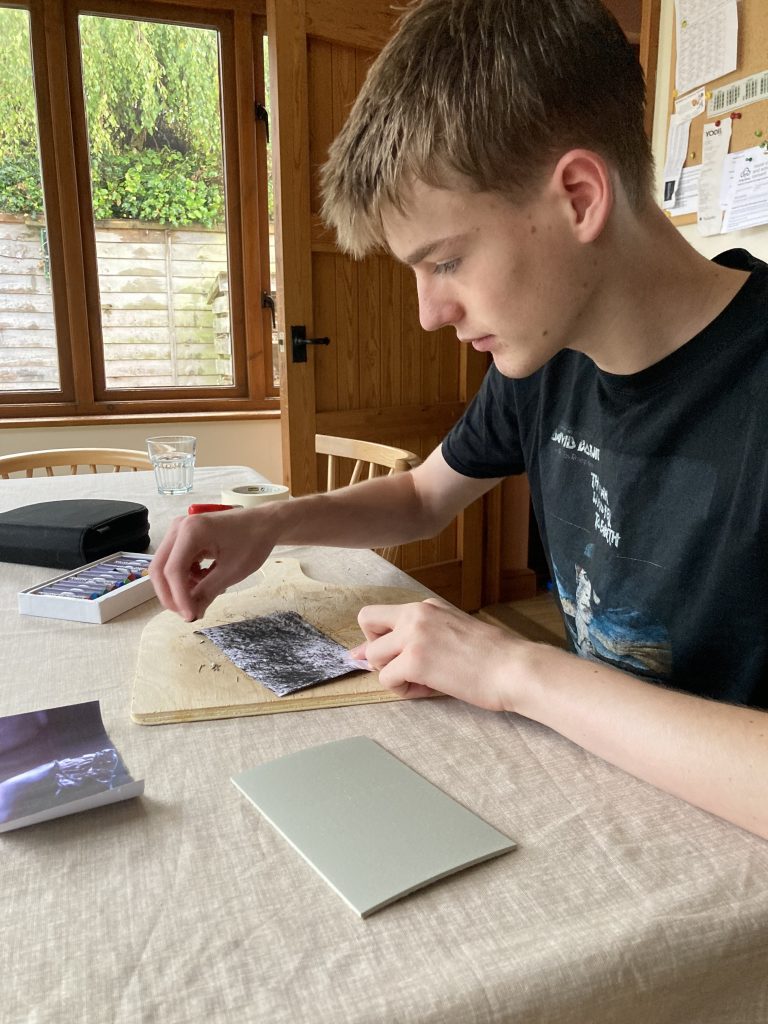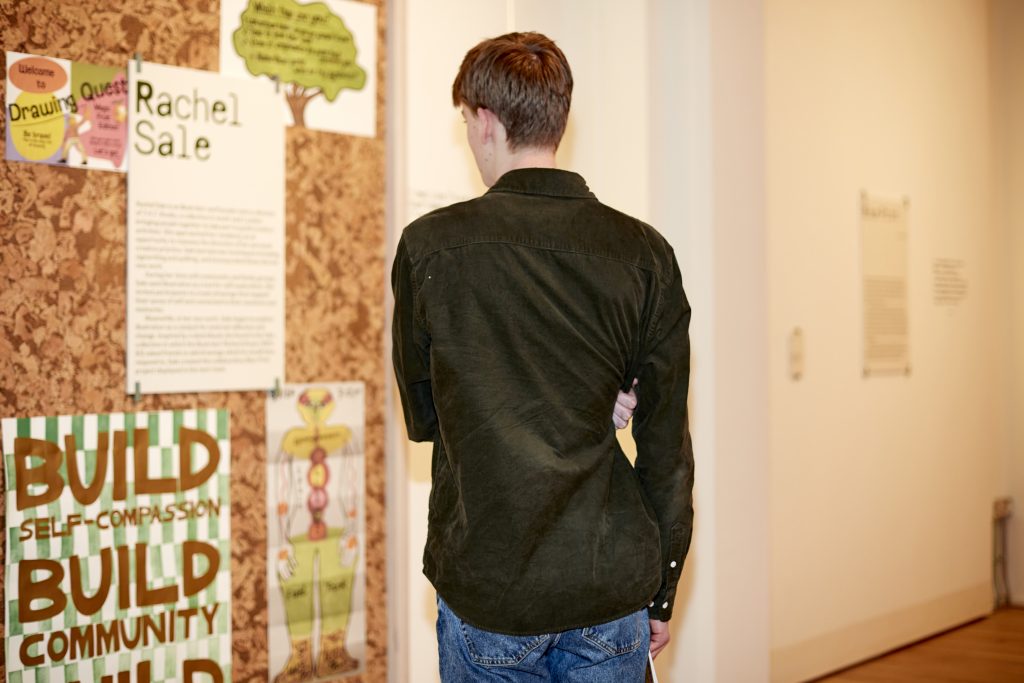We spoke to Barney, a former Art&Design Saturday Club member in Cambridge and current Youth Board member, about how the Club shaped his creativity and confidence. He joined while studying for his GCSEs, looking for a space to explore art beyond school. The experience introduced him to new mediums and approaches, and taught him the value of perseverance and experimentation. Now studying A-levels in Art, Philosophy, English Literature and Core Maths, Barney is exploring interests in journalism, film and media while continuing to champion youth voices through the National Saturday Club Youth Board.
What sparked your interest in attending an Art&Design Saturday Club?
I was doing my GCSEs at the time and was really enjoying art, even though it was a lot of work. My teacher mentioned the Saturday Club and suggested I check it out. Around that same time, I went to a talk with a music producer during a school trip. He spoke about how important it is to give things a go when opportunities come along. That really stuck with me, so I thought why not join the Saturday Club? The timing just felt right.
Back then I was quite shy and didn’t do many clubs after school because I was usually exhausted, but I knew if I didn’t at least try it, I’d regret it later.
Tell us about your experience at the Club, was there a difference between what you were doing at school and what you were doing at the Club?
Definitely. Art at school felt very structured. You’d do one task, then move on to the next, with lots of writing, analysis and research. At the Saturday Club, every few weeks we tried something completely new. We explored different mediums and approaches I’d never even considered before.
It was such a contrast to GCSE art. At school, everything had to be annotated and justified. At the Club, we could just make for the sake of making, without pressure. It was experimental, creative and fun. I still remember the printmaking sessions where we tried out linocut, something I’d never heard of before. Now, I’m actually doing linocuts as part of my A-level, so I feel like the Club gave me a real head start.
Did you learn any specific skills at the Saturday Club that you still use today?
The different projects we did at the Club ran for a number of weeks each which helped me to develop perseverance. I have a natural tendency to abandon a project if it is not going as I initially planned as I am guilty of being a bit of a perfectionist. What I learnt from the Club is that a project evolves and develops, at times it may look like a bit of a mess, but if you just push through that stage you may end up with something really cool.
Did you learn about different careers you can go into?
As part of the programme, we had a few sessions on interior design which really opened my eyes to creative careers. During these sessions, we had the chance to look at potential briefs imitating real world assignments; allowing us to problem solve and learn more about creativity in a workplace environment.
I’d always thought humanities and creative subjects weren’t as valid as STEM, since school pushed science and maths careers so much. The Club showed me just how valuable creativity is, especially now, with AI on the rise. We need imaginative thinkers just as much as analytical ones.
Do you have any standout memories at the Club?
The standout memories for me would be the London Visit we went on. We had the opportunity to visit the Tate Modern which was just incredible. It was amazing to see the actual works of artists I really admired in person, rather than just on a computer screen. We also went to a Chris Killip photography exhibition, which I found super informative as photography is not really something I had looked at much before.
The Summer Show was the ultimate highlight, it was fantastic to see everyone’s work so professionally curated and to gain an insight into what the other Clubs had been up to.
I also loved the weekly sessions at the Club in Cambridge. We worked with artists, photographers and printmakers from the area, all of whom were so passionate. One of my favourite activities was a photography walk around Cambridge, even visiting a cemetery to experiment with shots. It was a nice way of having that local touch as well.
What are you up to now and what next steps are you considering?
I’m studying for my A-levels which are in Art, Philosophy, English Literature, and Core Maths as an extra half A-level. I’ve also joined the National Saturday Club Youth Board, but most of my focus is on preparing for exams at the moment.
English Literature is one of my favourite subjects, so I’ve thought about journalism. I also have a real passion for film and media. In a dream world, I’d love to be a film critic but I’m keeping my options open because I’ve got a lot of different interests I’d like to explore.
Why did you decide to join the National Saturday Club Youth Board?
Honestly, I hadn’t thought much about being on a Youth Board until I heard about it. But once I did, it felt important. Youth voices are integral and I knew if I didn’t apply I’d regret it. So I gave it a shot, and I’m really glad I did.
Since being part of it, what has your experience been like and have you learnt anything new?
It’s been amazing. Everyone on the Youth Board comes from different Clubs and backgrounds which makes for such interesting discussions. I’m usually quite a reserved person, but the Youth Board has given me a safe space to express myself and share ideas.
I’ve learnt so much about collaboration and communication. At our last meeting we practised using “yes, and…” instead of “no” or “yes, but…”. It sounds simple, but it really changes how conversations flow. This is something I have implemented and have noticed how it improves communication when working on collaborative projects with my peers.
Who, what or where inspires you?
I don’t think I can narrow my inspirations down to a single source, but I recently went to an Andy Warhol exhibition in Milton Keynes and was hugely impressed and inspired by the scale of his work. I am also a huge David Lynch fan, I find his film and TV work to be endlessly inspiring due to its surreal and abstract nature, lending itself to multiple interpretations. I can always take something different away each time I watch something of his. In terms of music, David Bowie’s refusal to confine himself to one genre or style and his willingness to experiment through constant reinvention, I find endlessly inspiring. Recently I have been listening to Nina Simone and really love the emotional impact her music can have.
If there’s one thing that you could make better in the world, what would it be?
The obvious answer is peace and harmony, but on a smaller scale, I’d love to see more recognition for the arts. STEM subjects get so much focus especially in secondary school, while creative subjects are often dismissed. I’ve had people say things like, “Why are you doing English A-level? That won’t get you a job unless you’re a teacher.” But there are so many careers in the humanities and creative fields that people just don’t know about. If we promoted the value of creativity more, I think more students would feel confident pursuing it.


Interview conducted and edited by Suprina Thapa